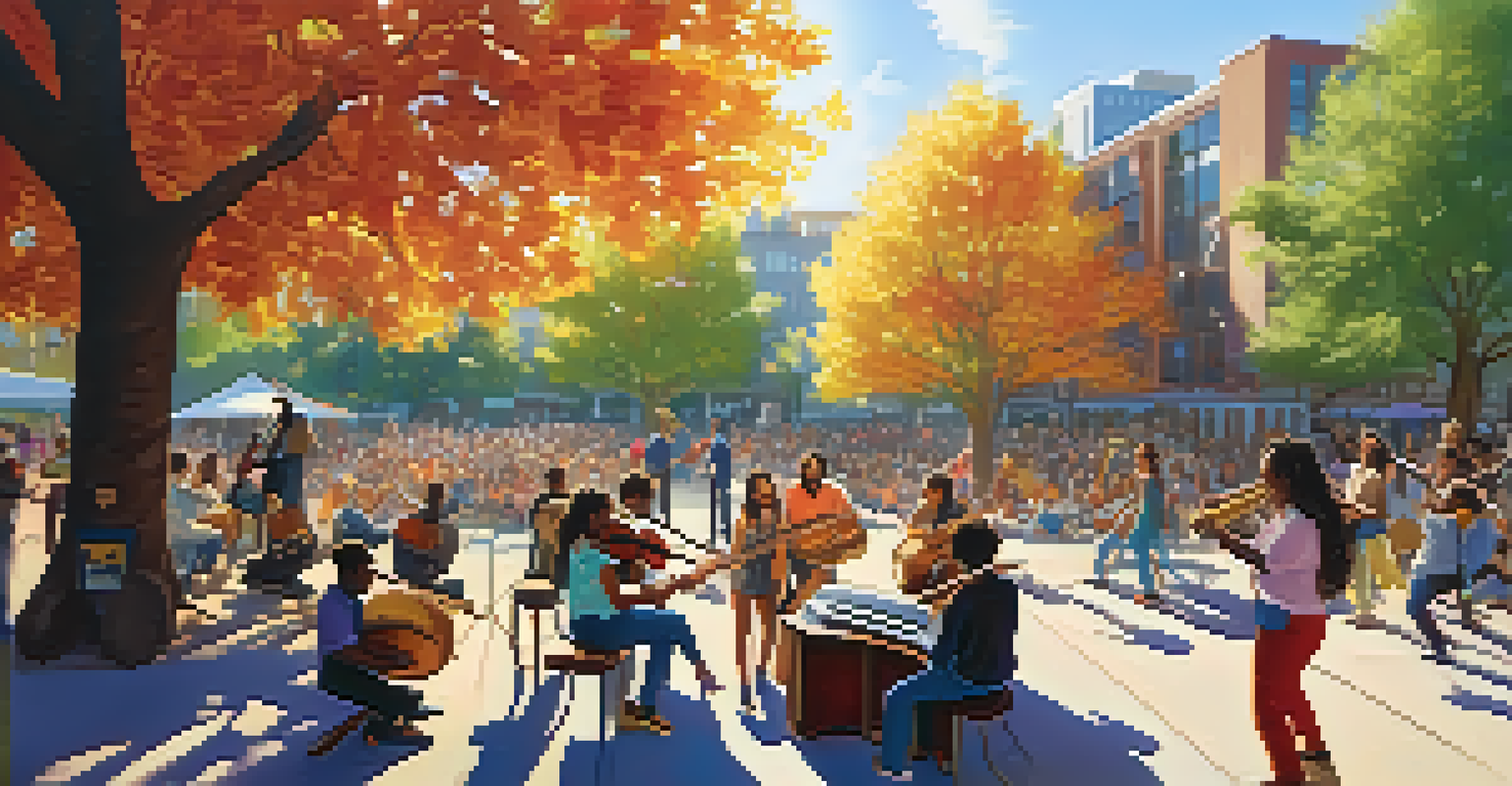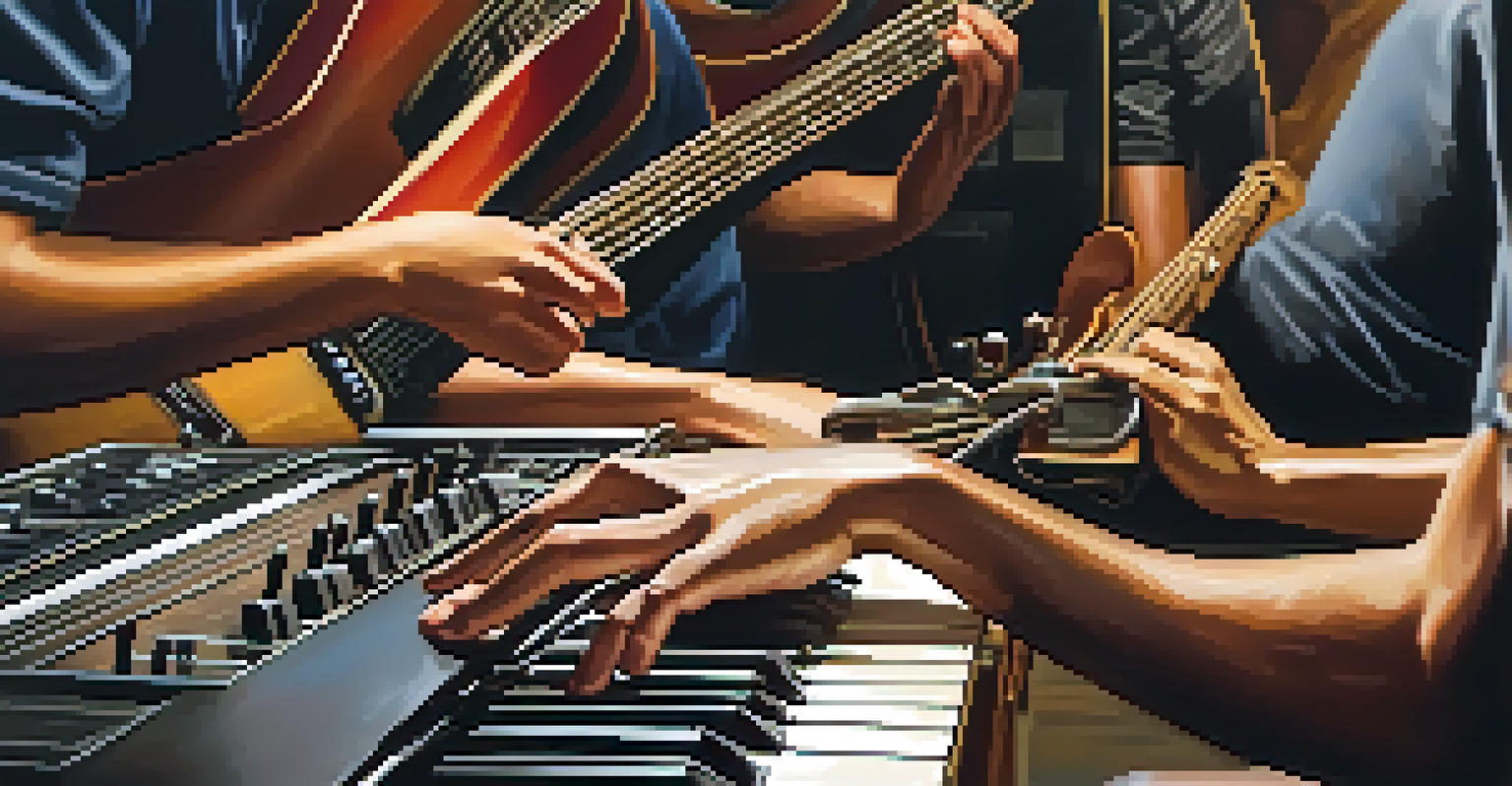Exploring the Relationship Between Music and Conflict Resolution

Understanding Music's Role in Human Emotions
Music has an incredible ability to evoke emotions, often serving as a universal language that transcends cultural barriers. Whether it’s a soothing melody or an upbeat rhythm, music can alter our mood, helping us feel connected to others. This emotional connection is essential in conflict resolution, as it fosters empathy and understanding among individuals with differing viewpoints.
Music can change the world because it can change people.
Consider a situation where two people are in disagreement; playing a calming piece of music can create a more relaxed atmosphere. This shift can make it easier to engage in meaningful dialogue, allowing both parties to express their feelings without escalating tensions. Thus, music not only enhances emotional well-being but also serves as a tool for opening channels of communication.
Moreover, music reflects diverse experiences and narratives, providing a platform for those affected by conflict to share their stories. By listening to songs that speak to struggles and resolutions, individuals can gain insights into each other’s perspectives, leading to greater compassion and resolution.
Historical Examples of Music in Conflict Resolution
Throughout history, music has played a pivotal role in various social movements and conflict resolutions. For instance, during the Civil Rights Movement in the United States, songs like 'We Shall Overcome' became anthems of unity and hope, helping to galvanize supporters and foster a spirit of resilience. These musical expressions not only uplifted spirits but also communicated powerful messages of peace and equality.

In more recent times, music festivals and concerts have been organized in war-torn regions to promote peace and healing. Events like these bring together individuals from conflicting sides, using the power of music to shift focus from hostility to harmony. Such gatherings help to humanize the 'other' and create shared experiences that can lead to reconciliation.
Music Eases Conflict and Builds Trust
Music fosters emotional connections that can transform disagreements into constructive dialogues.
These historical examples illustrate that music is more than mere entertainment; it can be a strategic tool for change, capable of uniting individuals and communities in the face of adversity. By reflecting on these moments, we can appreciate the transformative power of music in resolving conflicts.
The Psychological Impact of Music on Conflict
Research has shown that music can significantly impact our psychological state, influencing behaviors and attitudes. Listening to specific genres can reduce anxiety and promote relaxation, making it easier to approach difficult conversations. This psychological shift is crucial in conflict resolution, as it sets a tone that is conducive to understanding rather than aggression.
Without music, life would be a mistake.
Furthermore, engaging in music-making activities, such as group drumming or singing, can enhance teamwork and cooperation among participants. These shared experiences foster trust and connection, enabling groups to tackle conflicts collaboratively. When individuals feel a sense of belonging, they are more likely to work together toward a common goal.
Thus, the psychological benefits of music extend beyond mere enjoyment; they serve as foundational elements in building relationships and resolving conflicts. By harnessing these effects, we can create spaces where dialogue thrives and tensions dissipate.
Music as a Tool for Cultural Understanding
Music often reflects the cultural identities of those who create it, offering insights into their histories and values. By exploring different musical traditions, individuals can gain a deeper appreciation for diverse perspectives, which is vital in multicultural societies. This understanding can ease tensions and pave the way for more respectful dialogue during conflicts.
For example, intercultural music projects—where artists from different backgrounds collaborate—can help break down stereotypes and foster mutual respect. These initiatives not only celebrate diversity but also highlight common themes in human experience, creating bonds that transcend cultural divides. When people see the beauty in each other's traditions, they are more likely to engage in constructive interactions.
Historical Impact of Music in Peace
Throughout history, music has united communities and supported social movements, demonstrating its power as a tool for change.
In this way, music functions as a bridge, connecting individuals from various backgrounds. By embracing these connections, we can cultivate environments where conflicts are viewed as opportunities for learning rather than battles to be won.
The Role of Music in Peacebuilding Initiatives
Peacebuilding initiatives often incorporate music as a means to foster dialogue and healing in post-conflict environments. Programs that use music therapy can help individuals process trauma and express their feelings in a supportive setting. This therapeutic aspect of music is invaluable in rebuilding communities torn apart by conflict.
Additionally, community music projects can bring together people from different backgrounds, encouraging collaboration and understanding. These projects often focus on shared goals, such as creating a song or performing together, which can help dissolve barriers and build a sense of unity. The act of creating something together fosters camaraderie, making it easier to engage in conversations about difficult topics.
Ultimately, the integration of music into peacebuilding efforts illustrates its potential to heal wounds and promote reconciliation. By recognizing music as a vital component of these initiatives, we can enhance the chances of creating lasting peace.
Case Studies of Successful Music-Driven Resolutions
There are numerous case studies that highlight the effectiveness of music in resolving conflicts. One notable example is the 'Playing for Change' project, which brings together musicians from around the world to create collaborative songs and videos. This initiative not only promotes global unity but also provides a platform for marginalized voices, encouraging listeners to empathize with different experiences.
Another inspiring case is the 'Song for Peace' initiative in conflict zones, where local musicians write and perform songs that promote peace, tolerance, and healing. By channeling their talents toward positive messages, these artists can influence their communities and inspire hope where it is needed most. The impact of such efforts demonstrates the profound ability of music to serve as a catalyst for change.
Future of Music in Healing Divides
Advancements in technology and education will amplify music's role in promoting empathy and understanding across cultures.
These case studies reinforce the idea that music is not just a background element but a powerful agent in conflict resolution. By examining these successful initiatives, we can learn valuable lessons about the role of creativity in fostering peace.
Future of Music in Conflict Resolution
As we look to the future, the role of music in conflict resolution is likely to expand even further. With advancements in technology, musicians can connect and collaborate across borders, creating a global movement centered on peace and understanding. Social media platforms enable artists to share their messages with larger audiences, amplifying the impact of their work.
Moreover, educational programs that integrate music into conflict resolution training can equip individuals with the tools they need to navigate disagreements constructively. By teaching the next generation about the power of music in fostering empathy and collaboration, we can cultivate a culture that prioritizes dialogue over discord.

In conclusion, the future of music in conflict resolution is bright and full of potential. By harnessing its power, we can continue to build bridges, heal wounds, and work toward a more peaceful world.